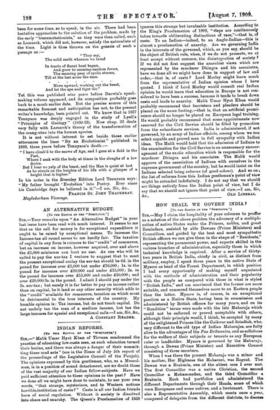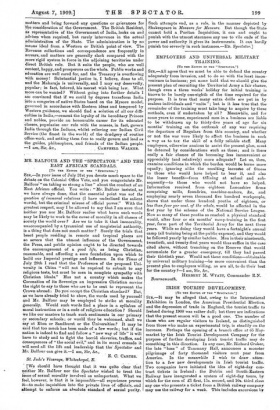HOW SHALL WE GOVERN INDIA
[TO TOR EDITOR Or TIER " SPECTATOR....1
SIR,—May I claim the hospitality of your columns to proffer as a solution of the above problem the advocacy of a multipli- cation of native States under the Princes, nobles, and great Zemindars, assisted by able Dewans (Prime Ministers) and Councillors, and guided by the best and most sympathetic British officers we can give them in the shape of " Residents," representing the paramount power, and experts skilled in the various branches of administration, especially those in which technical knowledge is required. After a service of thirty- two years in British India, chiefly in civil, as distinct from military, employ, I spent three years in the native State of Mysore as head of the Forest Department, in which position I had every opportunity of making myself acquainted with the methods of administration and their popularity with the people as compared with those in what is styled "British India," and am convinced that the former are more suitable, and commend themselves more to an Eastern people than the latter. Mysore is, of course, in an exceptional position as a Native State, having been in commission and administered by British officers for many years, and on its "Rendition" terms were made with the late Maharaja which could not be enforced or proved acceptable with others, although their principle would, I think, be accepted by many of the enlightened Princes like the Gaikwar and Sciudiah, who, very different to the old type of Indian Maliarajtus, are fully alive to the advantages of the Pax Britannica, and as solicitous for the welfare of their subjects or tenants as any European ruler or landholder. Mysore is governed by the Maharaja, through a Dewan (Prime Minister) and Executive Council consisting of three members.
When I was there the present Maharaja was a minor and his mother, Her Highness the Maharani, was Regent. The Dewan was a Brahmin, one of the ablest men I ever met. The first Couucillor was a native Christian, the second Obuncillor a Mohammedan, and the third Councillor a Brahmin. Each had portfolios and administered the different Departments through their Heads, some of which were Europeans and some natives, and a lieutenant. There is also a Representative Assembly, which meets once a year, composed of delegates from the different districts, to dismiss matters and bring forward any questions or grievances. for 'the:Consideration of the GovernMent.:. The British Resident, se representatiie of the ,Government of India, looks on and , advises when required, but rarely :intervenes in the actual Mitilinistrition of the State. The administration is by no ; means ideal from a Western or British point of view. The Revenue collections and correspondence ,are frequently in :arrears, and matters are generally slack compared with the more'rigid system in force in the adjoining territories under . direct British rule. But it 'snits the people, who are well :content, happy, and prosperous on the whole. Public works and :education are well cared for, and the Treasury is overflowing With money! Substantial justice is, I believe, done to all, and the Maharaja is universally, and I may say deservedly, popular ; in fact, beloved, his merest wish being law. What more can be wanted? Without going into further details I am convinced that if we could by degrees transform India into a congeries of native States based on the Mysore model, governed in accordance with Eastern ideas and tempered by Western guidance, we should find a solution of all our diffi- culties in India,—cement the loyalty of its hereditary Princes and nobles, provide an. honourable, career for its educated classes, popularise our rule with the masses, in fact, govern India through the Indians, whilst relieving our Indian Civil Service (the finest in the world) of the drudgery of routine office-work, and setting them free to really govern and lead as the guides, philosophers, and friends of the Indian people.







































 Previous page
Previous page